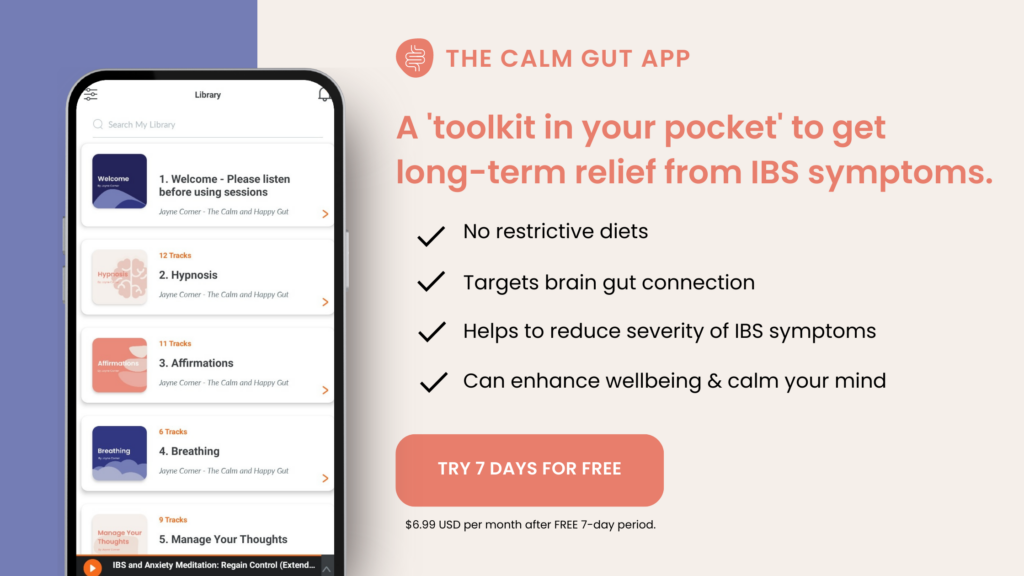One of the most common questions I get asked by my clients as an IBS specialist is ‘’But why me? Why do I have IBS?” ”What caused all these symptoms in the first place?”
And if you’re currently struggling with IBS symptoms, I’m guessing this question has crossed your mind more than once.
Now while there is no definitive cause of IBS, in this post I’m breaking down the 6 most common factors that appear to play a role in the development of Irritable Bowel Syndrome and which can be responsible for the initial flare up of your symptoms.
So if you’re wondering ‘’why me?” then I hope this will help give you some answers.
Let’s get started.
Factor number 1: Developing IBS after viral gastroenteritis (also referred to as a stomach flu)
With gastroenteritis, your stomach and intestines are irritated and inflamed, and in the case of viral gastroenteritis the cause is from a virus such as norovirus or rotavirus. It’s thought that IBS can develop post infection because of the persistent low grade inflammation in the gut.
And if this happens it’s called Post-Infectious IBS.
Factor number 2: Stomach bug caused by bacteria
IBS can also develop from a stomach bug or gastroenteritis when you have a bacterial infection inside of the gut. Again, persistent low levels of inflammation can trigger IBS to develop, but in addition an infection in the digestive system may result in injury to the nerves lining the gut which are responsible for gut motility (which is the speed at which food moves through the bowel) and sensation (which is going to make you a lot more sensitive causing pain and irritation.)
This can be the case with certain types of Food Poisoning in particular from a bacteria called Campylobacter. But can also happen after Salmonella and E.Coli.
So how does food poisoning develop into IBS? Well it has to do with certain bacteria producing a toxin that can disturb bowel function, and can change the nerves in the lining of your gut.
Again, this is called Post Infectious IBS and is found more commonly in women. Interestingly it’s been found that between 6-17% of individuals with IBS who had a previously normal bowel habit believe their illness began suddenly in association with this type of infection. And although estimates vary, studies suggest that around 10% of people who suffer bacterial gastroenteritis develop IBS.
Furthermore, bacterial infection such as Campylobacter can also change pre-existing IBS subtypes with 50% of people who had constipation dominant IBS change to either mixed or diarrhoea dominant.
Factor number 3: Experiencing early life stress
There are numerous studies looking at the correlation between being exposed to stress during early life and the increase in susceptibility to IBS.
Why does this happen? Well research has shown that Stressful childhood events trigger abnormal signalling from a protein called nerve growth factor, initiating a cascade of changes that ultimately lead to the development of irritable bowel syndrome (IBS). The finding uncovers a link between traumatic psychological events in childhood and lifelong health repercussions.
In addition, adverse early life events significantly impact upon many of the communication pathways within the brain-gut-microbiota axis. This axis allows for two-way interaction between the central nervous system (your brain) and the gastrointestinal tract. In IBS, this axis is seen to be dysfunctional.
If you want to learn more about the brain gut axis and its role in IBS, you can check out this post: Is a Faulty Gut Brain Connection Causing Your IBS?
Factor number 4: Changes in your gut microbes
Recent studies have demonstrated that an imbalance in gut bacterial communities, or “dysbiosis”, may be a contributor to the development of IBS. It’s believed that changes in your gut flora may contribute to low-grade inflammatory responses, and this can lead to activation of the gut immune system which can then affect others factors, triggering the onset of IBS symptoms.
Changes in your gut microbiota can occur after a GI infection such as gastroenteritis, and also after taking antibiotics. Both of can create changes in the composition of gut microbiota.
In fact I would say about 15% of the clients I see for IBS started experiencing IBS symptoms after following a course of antibiotics.
Factor number 5: Hormone changes post pregnancy.
Pregnancy is time of major hormonal changes, and these can have significant effects on the gut. In fact up to 25% of women report having digestive problems after childbirth. Unfortunately women are more likely to have IBS, and hormones are certainly a factor here in developing or worsening the condition. On the note of hormones, many women also find that their IBS symptoms are worse during or around their menstrual cycles.
Factor number 6: Chronic ongoing stress
Most of us know and have experienced the impact of stress on our digestive system, and whether or not you have IBS, when you experience stress, it’s not unusual to have gut symptoms. Whether this is nausea, tightness in the stomach or experiencing urgency and diarrohea. Stress and gut symptoms unfortunately kinda go hand in hand because of the close link between your brain and your gut.
In fact more and more clinical and experimental evidence shows that IBS is a combination of irritable bowel and irritable brain.
But unlike short periods of stress, for example presenting to a room full of people, or having to sit an exam, chronic stress is stress that goes on and on and on. And over time chronic stress can cause numerous issues in the digestive system. For example chronic stress can cause an imbalance of the bacteria inside of your gut which as you’ve just learnt can be one of the factors in developing IBS.
Stress and major life trauma are also known to worsen IBS symptoms and can have a marked impact on the sensitivity inside your intestines, the speed at which your bowel functions, and on secretion and gut permeability.
Many people can look back at stressful times in their lives and connect the dots with when they first started to experience the onset of IBS symptoms.
Now unfortunately with IBS, your IBS symptoms themselves can trigger stress and this can very easily lead you into what is known as the vicious stress and IBS symptom cycle.
This of course is a problem. Because the more you think about your gut symptoms, the worse they are likely to become, and therefore the more stressed you become.
So join me in this next post where I talk more about this vicious stress and IBS symptom cycle, and what you can do to finally get off it and break this cycle: Are You Stuck in the Vicious Anxiety and IBS Cycle?

